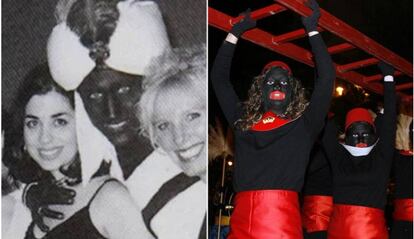After Justin Trudeau’s “brownface” row, should Spain change its attitudes?
The Canadian prime minister was forced to apologize after photos of him in costume emerged, so why is the practice still seen as inoffensive among many Spaniards?

In 2001 Canada’s current prime minister, Justin Trudeau, showed up at a party in “brownface” makeup. Time magazine recently published a photograph of that event, triggering a wave of criticism from social and political leaders. “Blackface is part of a history of dehumanization, of denied citizenship [...]. It is time to stop with the dismissive arguments of those that describe these offensive acts as pranks, ignorance and youthful indiscretions,” writes David Leonard, an associate professor of culture, gender and race studies at Washington State University, in an article in The Huffington Post. Trudeau has since apologized.
In Spain, the NGO SOS Racismo defines blackface or brownface as “a practice that perpetuates racism toward black people by ridiculing and exaggerating their traits, using makeup that simulates black skin and Afro wigs.”
To Americans, it’s more obvious. Here, it is passed off as a joke
Antumi Toasijé, historian
In Spain, some people have drawn parallels between the actions of the Canadian leader and an annual tradition in many Spanish towns: white people who paint their skin black every January 5 to play King Balthazar in the Three Kings parade, which recreates the biblical tale of the Magi’s journey to visit the baby Jesus in Bethlehem.
In 2014, then-Madrid Mayor Ana Botella was asked why a white person in blackface was playing the character of King Balthazar in the parade. “If we had a black city councilor, there would certainly be no problem with having a black king,” she replied, alluding to the long-held practice of selecting three city councilors to play the roles of the Three Wise Men.
Many US media outlets have traced the practice back to the 19th century, but Spain has many instances of blackface in plays dating back to the Golden Age, spanning approximately from the mid-1500s to the mid-1600s. At that time, white actors would go up on stage wearing dark makeup.
Pajes negros de L'@AjuntamentAlcoi, os decimos #alcoistopblackface porque el blackface es un ejemplo más de cosificación, humillación y despersonalización de personas afrodescendientes en España y tiene un trasfondo colonial. Es racismo. https://t.co/hOfxrIaSEH vía @Afrofeminas
— Es Racismo (@esracismosos) January 3, 2019
Black pages of the city of Alcoy, we tell you #alcoistopblackface because blackface is another example of how people of African descent in Spain are treated as objects, humiliated and dehumanized, and it has a colonial element. It is racism.
“We can see instances of blackface right there. After the Muslims were expelled from the Iberian peninsula, this was a way of ridiculing them through public performances. It coincided with a rise in the number of enslaved people from Africa,” says Antumi Toasijé, a historian and director of the Kituo cha Wanafrika Pan-African Studies Center.
In the 1500s and 1600s, actors would darken their faces with burnt cork. “Black people were portrayed as lascivious, or as having funny-sounding accents,” adds the historian, noting that there were sometimes also black actors in these plays, but that they normally played the same stereotyped roles played by white actors in blackface. “It was a very popular, insulting type of comedy,” says Toasijé.
The head of this research center feels that the biggest case of blackface in Spain these days is the Three Kings parade in Alcoy, in Alicante province. The event has been held since 1885, making it the oldest in Spain, and hundreds of locals paint their faces black and their lips red to represent black pages accompanying the kings of Orient. “They represent enslaved people. Alcoy is the spot in Spain with the most massive case of blackface,” says Toasijé.
The Alcoy parade has been officially designated as a cultural asset (BIC) and as an event of national interest for tourism. “We are not being disrespectful, this is not blackface or a manifestation of racism,” said the local councilor in charge of the festivity in statements to Eldiario.es ahead of the latest parade.
We are not being disrespectful, this is not blackface or a manifestation of racism
Alcoy city official
Toasijé thinks that Spaniards are still not fully aware of the racist component of blackface. “Spanish society is different to American society. While there is racism and racist violence here, the degree of social aggressiveness [against black people] is not the same as in the United States. To Americans, it’s more obvious. Here, it is passed off as a joke.”
In December 2017, the soccer player Antoine Griezmann, who was then with Atlético de Madrid, shared a photograph on social media where he was seen wearing blackface makeup and an Afro wig, in an attempt to look like a basketball player. The occasion was a costume party where the theme was the 1980s. The French player ended up deleting the picture after receiving negative comments on social media and complaints from several organizations.
“I think that social media have helped create a bigger impact for our demands,” says Toasijé. And even though protests by Spain’s community of African descent have failed to introduce changes to the Alcoy parade, many other cases have been successful. In Madrid, for instance, a black person played King Balthazar at the 2015 Three Kings parade.
“There are still a few parades that do blackface, but they are fewer and fewer,” notes Toasijé. “But you still see the odd Balthazar in blackface makeup at schools.”
English version by Susana Urra.
Tu suscripción se está usando en otro dispositivo
¿Quieres añadir otro usuario a tu suscripción?
Si continúas leyendo en este dispositivo, no se podrá leer en el otro.
FlechaTu suscripción se está usando en otro dispositivo y solo puedes acceder a EL PAÍS desde un dispositivo a la vez.
Si quieres compartir tu cuenta, cambia tu suscripción a la modalidad Premium, así podrás añadir otro usuario. Cada uno accederá con su propia cuenta de email, lo que os permitirá personalizar vuestra experiencia en EL PAÍS.
¿Tienes una suscripción de empresa? Accede aquí para contratar más cuentas.
En el caso de no saber quién está usando tu cuenta, te recomendamos cambiar tu contraseña aquí.
Si decides continuar compartiendo tu cuenta, este mensaje se mostrará en tu dispositivo y en el de la otra persona que está usando tu cuenta de forma indefinida, afectando a tu experiencia de lectura. Puedes consultar aquí los términos y condiciones de la suscripción digital.









































